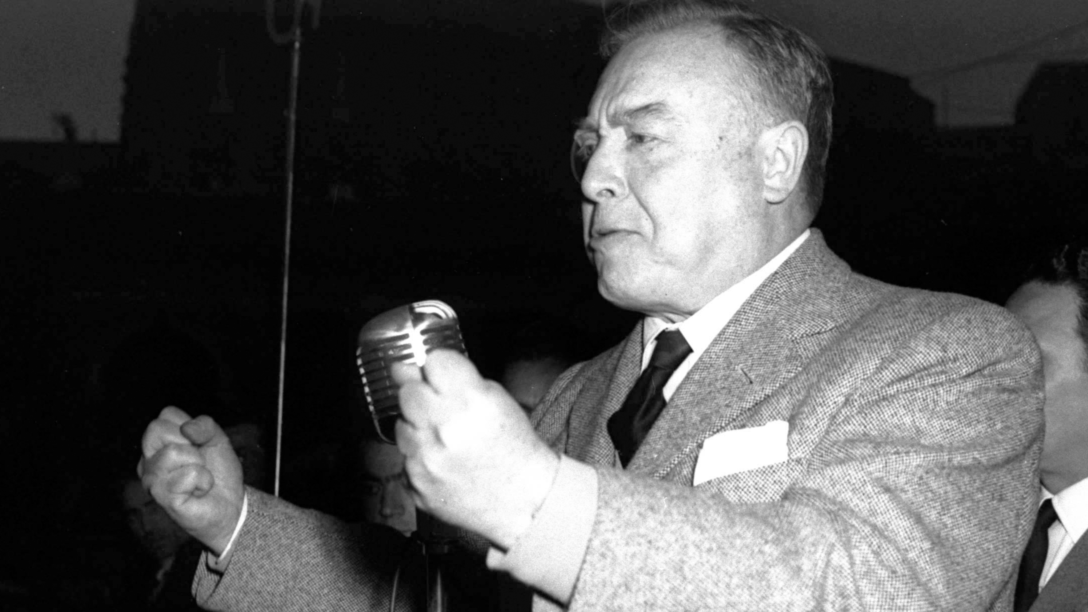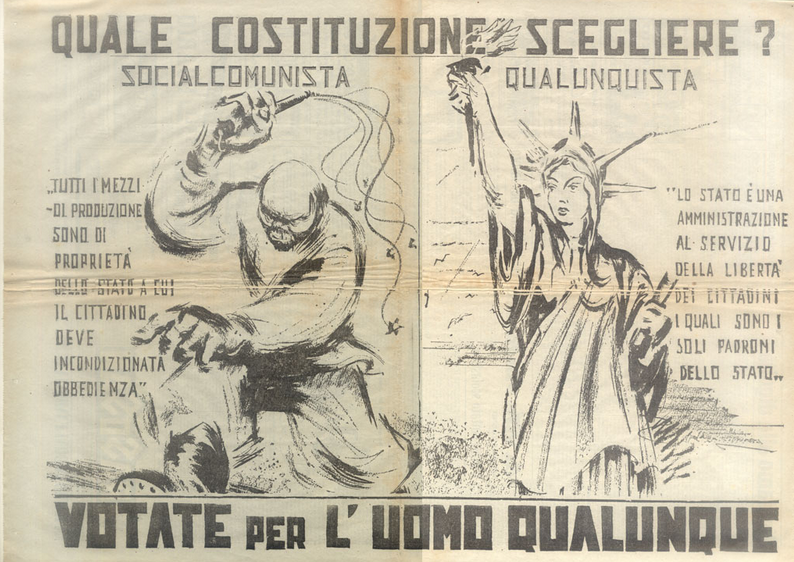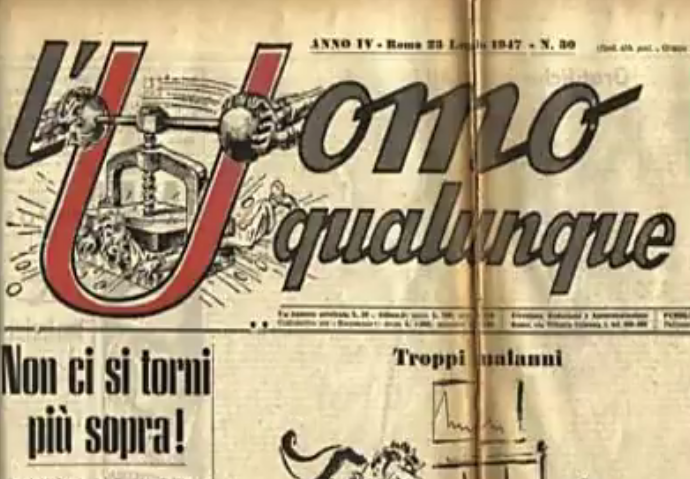Guglielmo Giannini considered himself a normal man, nay, an ordinary man, so much so that he founded a newspaper, L’Uomo qualunque (“The common man”) in December 1944. Italy was half occupied by the Germans, and half liberated by the Allies; the partisans were holed up in the mountains fighting against Salò’s repubblichini; Mussolini, at work on his memoirs, waxed defeatist to the occasional foreign journalist; Rome had been liberated six months prior, and Paris, just three; and the Soviet Union was soon to enter Warsaw. In the middle of all of this, Giannini declared: “This is the newspaper of the common man, who’s fed up with all, and whose only, burning desire is not to be bothered.”
The son of Federico, an anarchist journalist from Naples, and a British woman named Mary Jackson, Guglielmo Giannini had been a writer, playwright and director before assuming a pivotal role in post-war Italian politics. Homeschooled as a libertarian, he was an avid reader of Marx’s Capital in his early youth. At nineteen, after having worked all sorts of jobs from bricklayer to clerk, he followed in his father’s footsteps and started writing satirical pieces for newspapers like Giornale del mattino and Il Domani. He fought in the Italo-Turkish War between 1911 and 1912, and volunteered in World War I. After the war, he returned to Rome, where he made a living writing comedies, pop songs and movies, until in 1943 his country fell apart.

L’uomo qualunque cost five lire, six outside of the capital—perhaps a quarter in today’s money. Its logo was stark and gruesome: a capital U (the first letter of the word uomo) with a press in the middle, screwed down by disembodied hands squeezing coins out of a white-collar worker’s body. “Down with everybody!” read the slogan underneath. In the first issue, a manifesto-like editorial’s closing lines recited: “I am the one who does not believe in anything or anyone any more. I am the common man.”
By May 1945, that is in less than six months, circulation rose from 25,000 to 850,000 copies. The time was ripe: on April 25 the National Liberation Committee of Upper Italy had announced a national insurgency and called for the death of all fascist leaders (including Mussolini, who was shot and hanged three days later). The war was over and the Italian population, deserted by the monarchy, hungover from the fascist ventennio, and exhausted from two years of civil war found itself at a historical turning point.
In August 1945, Giannini sent out a call to readers under the drain-the-swamp-style slogan, “Enough with the political parties! Let’s take back our country!”, soliciting proposals for reform. Weeks later he established the The Common Man’s Front. But Giannini was no revolutionary; his was a right-leaning, conservative, and ultimately self-immolating insofferenza directed against all things that challenged his resolutely middle-class consciousness. His ideal reader and interlocutor was the travèt (literally “little girder”)—an epithet derived from a 1863 comedy titled The Miseries of Mister Travet written in Piedmontese dialect, which told the story of a low-level civil servant devoted to his humble but respectable job, yet mistreated and oppressed by all.
In his attempts to express moderation and “common sense” in turbulent times, Giannini’s writings often made a mockery of that virtue. He had been appalled by the 1924 assassination of Giacomo Matteotti (Mussolini’s first eminent victim), but was soon complaining about how the issue had monopolized the news (“We are exaggerating now!”). He proclaimed his despair over the war in Spain and Italy’s invasion of Greece, and then praised Mussolini’s belligerent rhetoric: “Oh well,” he said in the wake of Mussolini’s declaration of war against France in 1940, “Now that we are here, let’s get to work and fix the world quick.” He rejoiced when the allies liberated Rome in June 1944, but soon complained that “Winter is coming, and we are losing precious time.” He despised fascist methods and practices, but had no strong qualms against the dictatorship. In short, he was a liberal.

The Common Man’s Front claimed no ideology and saw the State as an apolitical apparatus whose function was to organize not a “nation” but “the throngs.” “All we need is a good accountant,” Giannini wrote, “who would take up office on January 1 and leave it on December 31, with no chance for reelection.” He believed that the State had no role in the functioning of society, and that the economy was better left in the hands of private citizens. Though wary of capitalism’s excesses, he thought that the alternative was much worse: a centralized ethical state whose “ethics” would come at the cost of individual citizens’ freedom. He opposed communism and corporate capitalism alike, supported low taxation, and praised individual economic agency. But the new political party was not well received by existing factions. Rejected by Benedetto Croce’s Liberal Party, with which Giannini initially tried to join forces, it was also roundly highly denounced by the left: “The Common Man’s Front is a movement that both outlives and anticipates fascism,” wrote Velio Spano in L’Unità (the newspaper founded by Antonio Gramsci in 1924), “Its leaders speculate on Italy’s misfortune, they are but shady jugglers who are trying to resurrect fascism by dressing it as a clown.”
In the first free elections after the fall of fascism in the spring of 1946, the Common Man’s Front obtained modest results in the North and some major successes in the South, where, in cities like Palermo, Messina and Lecce, it became the leading party. In June of the same year, it obtained 5.3 per-cent in the elections for the constitution of the Constituent Assembly—a provisional parliamentary chamber charged with writing a constitution for the new Italian Republic. In two years’ time Giannini’s Common Man’s Front, now renamed as the Liberal-Democratic Front of the Common Man, had become the fifth most powerful party, after the Christian Democracy, the Italian Socialist Party, the Italian Communist Party, and the National Democratic Union, at the most important political crossroads in the history of modern Italy. Yet it is not because of his party’s success that Giannini is remembered now.
Unable to gather its antagonistic views on realpolitik, its ideological direction, and the foul-mouthed rhetoric of its newspaper into a coherent agenda, Giannini’s party soon lost its appeal, and ended up making improbable allegiances with hardcore monarchists and fascist nostalgics that led nowhere. By June 1948, with the new national elections, Giannini’s movement had dissolved, its electorate re-absorbed by the traditional Liberals and Democratic Christians. Yet the legacy of this one-hit political wonder is one that many may argue is even more lasting than political glory: a word.
If you look on Wikipedia for the entry “political apathy,” and then follow the link to the Italian equivalent for that entry, you won’t find anything like apatia politica, the literal translation of that phrase; instead you’ll land on the entry for Qualunquismo—“a political attitude inspired by the Common Man’s Front, which rejects or at least intentionally ignores the political aspect of living together.”
The similarities between Giannini’s qualunquismo and what is going on today in Salvini’s Italy (or Trump’s America, Duterte’s Philippines, Erdogan’s Turkey, and Bolsonaro’s Brasil) are both obvious and misleading. I would love to be able to dismiss the recent rise of xenophobic, ultra-nationalist and hyper-conservative politics in Italy and elsewhere as a mere collective brain fart in the manner of the failed and harmless Common Man’s Front. But that kind of liberal amusement won’t cut it, I am afraid. If qualunquismo took root in the political lexicon of Italy, and remained there, it means that this word pointed at something that was there all along: the appeal to absolute authority as a political panacea; unchecked democracy’s tendency to corruption; the threat of corporations against civil society; the devaluation of ethical aspects of ideology, whatever these may be; you name it. Against these seemingly overwhelming forces, it is hard not to throw in the towel and demand “not to be bothered.” Obliviousness to our historic weaknesses as a community resulted in a regression into reptilian instincts; it should not be an option now. We may never see a complete success in transcending human selfishness, but we haven’t set seen complete failure, either. What seemed harmless and amusing in 1944, seen through the telescope of 2019, might serve to recall people in many places in the world to the gravity of the task.






